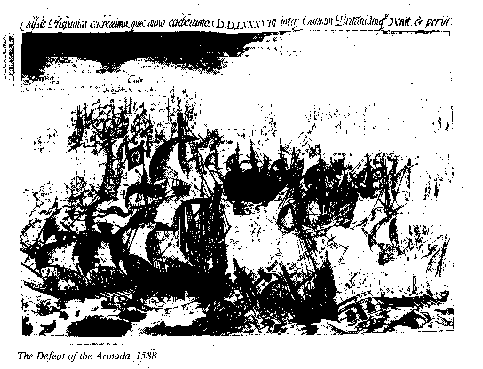
38
Mary's death and Drake's raid on Cadiz both took place in 1587. The next year was to be fateful for
England.
In August 1588 the Armada, the Great Spanish fleet, was in the Channel preparing to launch a full-scale
invasion.
Elizabeth was at the head of her nation. She went to the Camp other troups to encourage and inspire them
with such words: "Let tyrants fear. I have always so behaved myself that, under God, I have placed my
chiefest strength and goodwill in the loyal hearts and goodwill of my subjects...
I know I have but the body of a weak and feeble woman, but I have the heart and stomach of a King, and
of a King of England too".
The Spanish attempted invasion began in July, 1588. The heavy galleons of Philip's great Armada were
rather awkward against the quick English ships.
The "Invisible Armada" was defeated by the English ships and the storm in the English Channel. Scattered
by the winds, many of its ships were sunk or wrecked on the rocky coasts of Scotland and Ireland. It was a
glorious moment for England, and Elizabeth was the heroine of the hour. But that was not the end of the war
with Spain. Peace was made only after the death of Elizabeth.
James VI of Scotland, the son of Mary Stuart, didn't support Spain as he had been given to understand that
his right to the English throne would be honoured.
Ireland was another battlefield of Spain in the struggle against England and Elizabeth. It was only subdued
by the time other death. The best lands were captured by English landowners.
England had economic problems: inflation and unemployement. Enclosures of farm lands and wars, it
produced armies of beggars and thieves, and they roamed about the country in misery and crime.
The government passed the Elizabeth an Poor Law in 1601. It aimed at putting an end to beggars of all
kinds, the poor were put into workhouses.
In the 16th century the economic growth was getting faster, though still limited by feudal relations. Trade
and Industry were growing. The Royal Exchange was founded in 1571, East India Company – in 1600.
Education was further developing. Many Grammar schools were founded in the 16th century. New
foundations like Harrow and Rugby admitted clever boys as well as rich ones, and
could rightly be called
"public schools".
Elizabeth gave her name to the historical period, her reign (1558-1603) was described as "the Golden Age of
Elizabeth", the most colourful and splendid in English history. She was the embodiment of everything English,
and the English had found themselves as a nation.
The power of Spain was challenged on the seas and finally broken by the defeat of the Armada. Elizabeth
saw the foundation of the British Empire and the flowering of the Renaissance in England. The works of
Christopher Marlowe, Edmund Spenser and William Shakespeare were the foundation of the English literary

